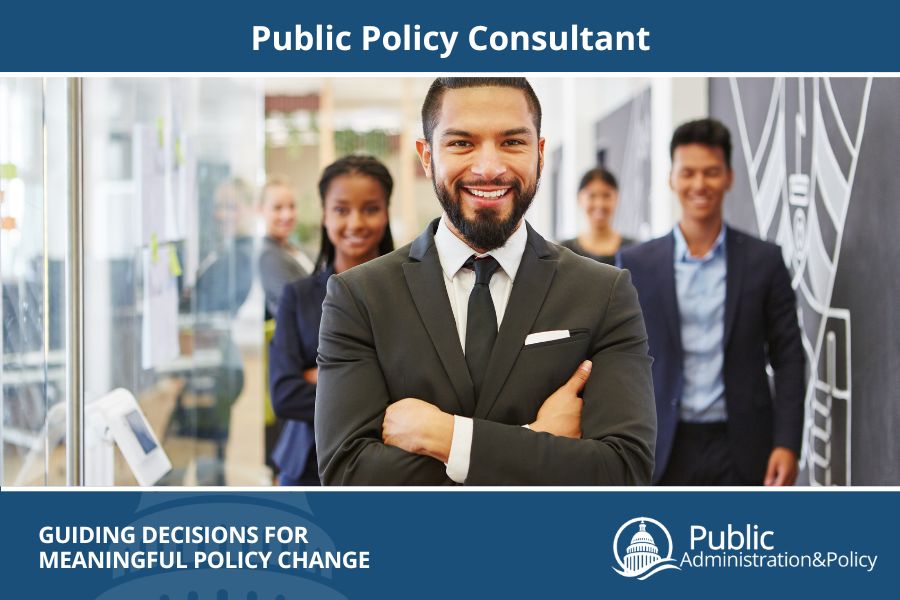How to Become a Public Policy Consultant
Partner with Leaders to Influence Decisions That Drive Progress and Create Solutions
Public Policy Consultants are trusted advisors who play a pivotal role in shaping policies that address some of society’s most pressing challenges. These professionals use their expertise to analyze complex issues, design innovative solutions, and guide governments, nonprofits, and businesses toward implementing effective strategies. Whether focused on improving healthcare access, advancing educational outcomes, or combating environmental crises, Public Policy Consultants are at the forefront of systemic change.
Their work involves conducting thorough research, evaluating data, and developing actionable recommendations that align with organizational goals and societal needs. Public Policy Consultants also excel in stakeholder engagement, building consensus among diverse groups, and fostering collaboration to ensure the success of proposed initiatives. Their ability to navigate the intersection of research, strategy, and communication makes them invaluable in driving impactful results.

Table of Contents
What Is a Public Policy Consultant?
A Public Policy Consultant provides advisory services to organizations seeking to create or improve policies. They use data analysis, stakeholder input, and industry expertise to recommend actionable solutions. Public Policy Consultants work across various domains, including education, healthcare, economic development, and sustainability.
Key Job Duties
- Research and Analysis: Assess existing policies and identify areas for improvement.
- Strategic Planning: Develop comprehensive plans to address policy objectives.
- Stakeholder Engagement: Collaborate with government agencies, nonprofits, and private sector partners.
- Advocacy: Present recommendations and advocate for policy adoption.
- Monitoring and Evaluation: Track the effectiveness of implemented policies and suggest adjustments.
Public Policy Consultants play a vital role in developing and implementing strategies that improve communities and organizations. Their work spans a wide range of issues, providing opportunities to shape public affairs, public service, and organizational effectiveness.
“Policy implementation in the end comes down to the people who actually implement it.”
— Michael Lipsky, Public Policy Scholar
A strong foundation in public policy, political science, or public administration is required to become a public policy consultant. These degree programs equip students with the skills needed to analyze and address complex societal issues effectively.
Best Degrees for Public Policy Consultants
- Bachelor of Public Policy: Provides a foundational understanding of governance, policy analysis, and public affairs.
- Master of Public Policy (MPP): Offers advanced training in policy design, data analysis, and program evaluation.
- Master of Public Administration (MPA): Focuses on leadership and public sector management.
- Ph.D. in Public Policy: Prepares individuals for research, academia, or high-level consultancy roles.
Why Online Programs Are Beneficial
Online degree programs offer flexibility for professionals who balance education and work. Many universities in the United States offer online MPP and MPA programs that allow students to specialize in areas such as healthcare, sustainability, or economic development.
Explore Degree Options:
Step 2: Learn About Public Policy Consultant Salaries
Public Policy Consultants enjoy competitive salaries, reflecting their level of expertise, industry, and work experience.
Salary Range by Experience
- Entry-Level Consultants: $60,000–$75,000 annually.
- Mid-Career Consultants: $80,000–$110,000 annually.
- Senior Consultants: $120,000–$150,000+ annually.
Factors Influencing Salary
- Education Level: Advanced degrees like an MPP or Ph.D. often lead to higher salaries.
- Specialization: Expertise in high-demand areas like healthcare policy or sustainability can command premium pay.
- Employer Type: Consulting firms and international organizations often pay more than government roles.
Visit the Bureau of Labor Statistics (BLS) for detailed salary insights for related consulting roles.
Step 3: Build Analytical and Leadership Skills
A career in public policy consulting requires a combination of analytical, communication, and leadership skills to succeed in addressing complex societal challenges.
Key Skills for Public Policy Consultants
- Data Analysis: Use statistical tools to evaluate policy impact.
- Strategic Thinking: Develop actionable recommendations based on research findings.
- Stakeholder Communication: Engage effectively with diverse audiences, including policymakers and community leaders.
- Project Management: Oversee policy implementation and monitor outcomes.
- Public Speaking: Present findings and recommendations at meetings or conferences.
Certifications to Enhance Your Career
- Certified Public Policy Professional (CPPP): Demonstrates expertise in policy analysis and implementation.
- Project Management Professional (PMP): Highlights proficiency in managing large-scale projects.
These skills and certifications enhance your ability to produce high-quality work and secure public policy advisor jobs in competitive sectors.
Step 4: Find a Public Policy Consultant Job
Public Policy Consultant jobs are available across various industries, offering opportunities to influence decision-making and create impactful change.
Industries That Hire Public Policy Consultants
- Government Agencies: Advice on regulatory compliance and program design.
- Nonprofit Organizations: Help design policies to address social challenges.
- Private Consulting Firms: Offer expertise in crafting and implementing policies for diverse clients.
- International Organizations: Work on global issues like climate change and economic development.
Notable Employers
Search for public policy consultant jobs on platforms like LinkedIn, Idealist, and USAJobs.gov. Use tools like “search for remote jobs” or “jobs by hiring path” to narrow your results.
Career Opportunities in Public Policy Consultancy
A career in public policy consultancy offers numerous pathways for advancement. Popular roles include:
- Policy Advisor: Provide strategic guidance to governments or organizations.
- Program Evaluator: Assess the impact of policies and recommend improvements.
- Think Tank Researcher: Conduct in-depth studies on policy issues.
- Sustainability Advisor: Focus on crafting policies for environmental and economic sustainability.
Professional organizations like the American Society for Public Administration (ASPA) offer resources to help you advance your career and meet education requirements for higher-level roles.
Sources
- Bureau of Labor Statistics (BLS). “Political Scientists.” https://www.bls.gov
- Brookings Institution. “Careers in Public Policy.” https://www.brookings.edu
- Payscale. “Public Policy Consultant Salary Overview.” https://www.payscale.com
- RAND Corporation. “Policy and Program Research.” https://www.rand.org
Acknowledgments
This content is informed by insights from policy scholars, consulting professionals, and academic institutions. Special thanks to Michael Lipsky for highlighting the critical role of implementation in effective public policy.
